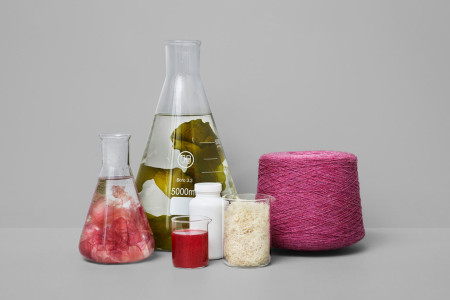
WHY THIS MATTERS IN BRIEF
Growing cotton is environmentally intensive and has a large environmental footprint – algae doesn’t and it’s just as good.
 Love the Exponential Future? Join our XPotential Community, future proof yourself with courses from XPotential University, read about exponential tech and trends, connect, watch a keynote, or browse my blog.
Love the Exponential Future? Join our XPotential Community, future proof yourself with courses from XPotential University, read about exponential tech and trends, connect, watch a keynote, or browse my blog.
The global fashion industry employs millions of people and is worth trillions of dollars.
It also accounts for 10% of global carbon emissions, creates pollution and waste which in India is so bad that it turns the rivers multi-coloured as all the various dyes from the clothing factories runs into rivers, and has all manner of other negative environmental impacts. Meanwhile, in the US, just 15% of textiles are recycled, while the rest are incinerated or sent to landfill.
That’s why one Israeli startup is creating a biodegradable, non-toxic, and low energy textile — a biomaterial made from algae. Its algae formula can be used to create natural fibers and dyes using less water than conventional products, and producing zero waste and pollution, said Renana Krebs, CEO and co-founder of Algaeing.
The company hopes to “harness the power of renewable algae to create a real, genuine impact against climate change,” she said.
Courtesy: Algaeing
Algae, which includes seaweed, is already being used in other industries including food, pharmaceuticals, and even biofuel sectors are all looking to this group of aquatic organisms as a sustainable material, and Krebs saw an opportunity to apply algae to textiles, too. Working in the fashion industry for 15 years, she saw first hand the industry’s pollution and waste. So, after quitting her job in 2014, she launched Algaeing in 2016.
The algae is supplied by another Israeli company, Algatech, grown in seawater in indoor “vertical farms” that run on solar energy. This means that unlike cotton, it doesn’t take up agricultural land, and it doesn’t have the carbon emissions associated with using fertilizer.
Algaeing converts the algae into a liquid formula that can then be used as a dye or turned into a textile when combined with cellulose, a plant fiber, which clothing manufacturers can do themselves using Algaeing’s proprietary recipe.
Other companies are seeing the potential of algae in textiles, too. Men’s apparel brand Vollebak has a biodegradable T-Shirt made from eucalyptus and beech pulp, and algae, that can be buried in the garden and breaks down to “worm food” in 12 weeks, and startup AlgiKnit is developing a wool-like yarn from seaweed.
Krebs said Algaeing’s focus is on changing the supply chain, and the company is preparing for the commercial launch of its patented technology in 2022.
Staggeringly, up to 2,700 liters of freshwater is required to produce the cotton for a regular T-Shirt, according to one WWF estimate — which is equivalent to one person’s drinking water for two years, said Krebs. But she said Algaeing’s fibers cut water use by 80%.
There’s a human impact too: those working in textile manufacturing are often exposed to dangerous chemicals and heavy metals. But the algae-based dye is non-toxic and allergen-free — which is also a plus for consumers.
“Algaeing are addressing three key pain points of the fashion industry: the reliance on freshwater to grow fibers; the use of chemicals, both in pesticides for growing fibers and also dyeing textiles; and thirdly, energy use,” said Erik Bang, innovation lead, H&M Foundation.
Currently, algae-based fibers are more expensive than conventional fibers like cotton, but Krebs said that as a sustainable and ethical product, it adds value to the brand.
The fashion industry is entrenched in tradition — but it’s also ripe for disruption, according to Erik Bang, innovation lead for the H&M Foundation, a non-profit that is privately funded by the founders and main owners of the H&M Group, and supports young fashion startups.
Bang said that in the past five years, awareness about sustainability in fashion has increased steadily, and that’s attracting “new types of investors” with diverse backgrounds in technology, material sciences, and biochemistry.
Algaeing received the H&M Foundation Global Change Award in 2018, and the company’s work with algae highlights a “brilliant potential source” of future textile fibers, said Bang, adding that while consumer behaviour is changing it’s still expensive for the industry to invest in sustainable technologies and scale them up.
“We need legislators to change the playing field, and tilt it so much more in the favour of the circular economy and sustainable practices, and punish the old habits,” said Bangs.
“We are creating a new generation, a new category of products,” said Krebs.



















